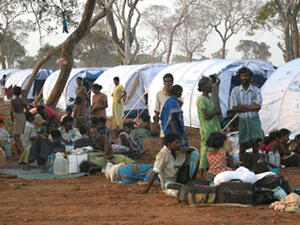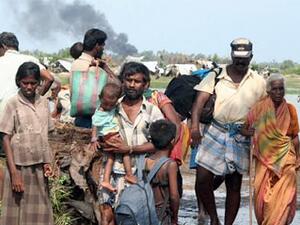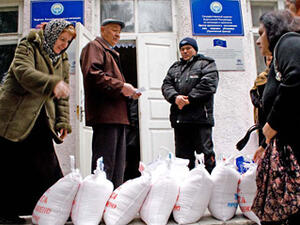UNHCR resources redeployed to Mauritania
UNHCR resources redeployed to Mauritania

Almost at the end of their journey, UNHCR trucks cross the River Senegal on a local ferry.
GENEVA, October 16 (UNHCR) - The UN refugee agency has successfully redeployed transport resources and aid supplies from Liberia to southern Mauritania after a gruelling 25-day cross-country journey.
The 20 UNHCR trucks and their cargo of humanitarian assistance arrived at Rosso in southern Mauritania on Monday. They will be used to support the voluntary repatriation and reintegration of Mauritanian refugees from Senegal and Mali, which is due to start later this month or early next month.
The convoy left Monrovia on September 21 and travelled some 1,000-kilometres through Liberia, Guinea and Senegal. The vehicles were driven by staff from the German aid agency GTZ, a partner of UNHCR.
They carried 2,000 buckets, 1,600 kitchen sets, 4,500 plates, 9,600 bars of soaps, 3,125 blankets, 3,920 jerry cans, 20 bales of fabric, 3,600 items of women's clothing and an unspecified quantity of mosquito nets.
"This was an extraordinary achievement. The redeployment was done under extreme conditions and it succeeded thanks to the perseverance of the convoy members," said Ursula Aboubacar, deputy director of UNHCR's Middle East and North Africa Bureau.
The convoy was sent to Mauritania as part of UNHCR efforts to maximize the use of existing resources and minimize the cost of the new operation. The UN refugee agency is looking at ways to redeploy as many assets as possible from other programmes currently phasing down in West Africa. It wound up the Liberia assisted repatriation programme at the end of June this year after helping more than 100,000 refugees go back home since late 2005.
The resources from Liberia will be badly needed by UNHCR, which is facing funding shortages for the Mauritania operation. The agency launched a US$7 million appeal at the end of August to fund the voluntary repatriation of 24,000 Mauritanian refugees, mainly from Senegal and Mali.
"This return will help resolve one of the most protracted refugee situations in Africa and represents the only durable solution in the Middle East and North Africa region at present. Some of the Mauritanian refugees have spent more than two decades in exile," UNHCR spokeswoman Jennifer Pagonis told journalists in Geneva on Tuesday.
"The 17-month operation, which faces some major logistical challenges, is scheduled to start this month," Pagonis said, while adding that "with only US$500,000 received so far, we fear serious delays."
More than 60,000 Mauritanians fled to Senegal and Mali in April 1989 when a long-standing border dispute between the two countries escalated into ethnic violence. Between 1996-98, UNHCR assisted with the reintegration of 35,000 returnees who decided to return to Mauritania spontaneously.
To mark World Refugee Day on June 20 this year, Mauritania's newly elected President Sidi Ould Cheikh Abdallahi announced his decision to invite all remaining refugees to return home.
According to a recent survey, some 24,000 Mauritanian refugees living in more than 250 locations in Senegal wish to return to some 50 communities in four regions of Mauritania. There are also Mauritanian refugees in Mali, some of whom have also expressed a wish to return home. Mauritania, Senegal and UNHCR are expected this week to sign a tripartite agreement setting out the legal framework for the return.
UNHCR will help the Mauritanian refugees return home by organizing safe transport and providing initial reintegration assistance in their places of origin. The agency will also support the local communities with infrastructure, health and education services. The operation has been carefully planned to avoid the rainy season and its travel difficulties.
"Due to limited absorption capacity and poor infrastructure in return areas, we plan to repatriate up to 7,000 refugees before the end of this year. Other refugees will go home in 2008," Pagonis said.









